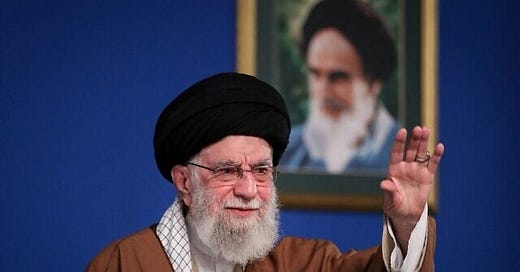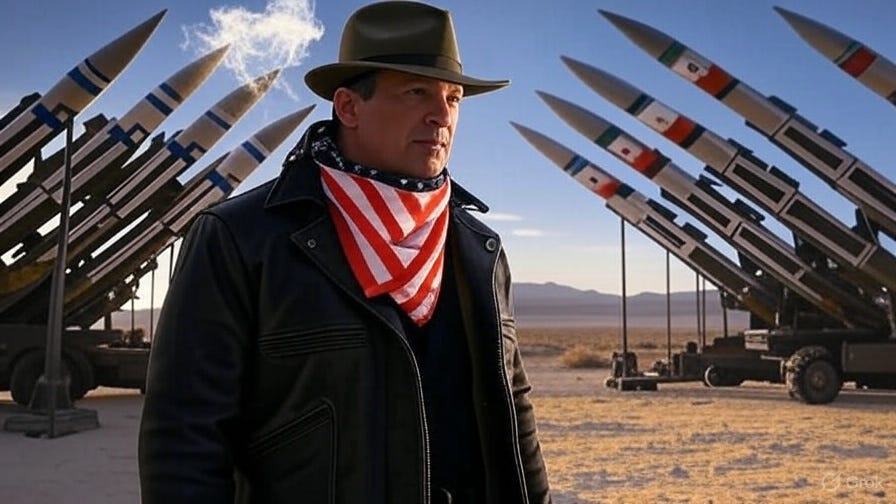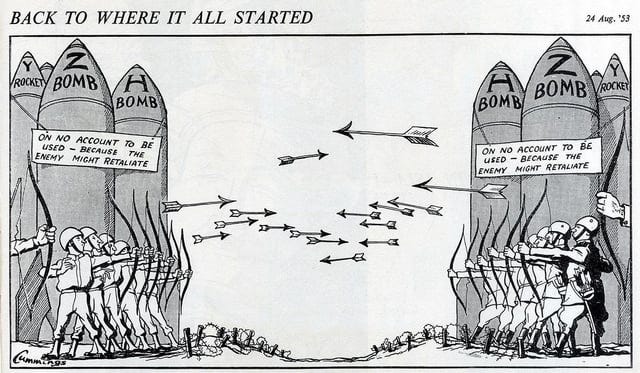By now, you’ve probably caught up on the latest happenings: President Trump has bombed three of Iran’s nuclear sites — Fordow, Natanz, and Isfahan. The extent of the damage is unclear, with Vice President J.D. Vance and The International Atomic Energy Agency (IAEA) suggesting that the target of the U.S. bombing mission, Iran’s enriched uranium stockpile, is still intact.

The stated purpose of the strike on Iran’s nuclear facilities, aka “Operation Midnight Hammer,” was to halt its crafting of an atomic bomb. Iran’s uranium refinement is at 60 percent, well beyond the 5 percent needed for civilian use. Such a grade of purity allows it to develop a nuclear weapon within weeks.
Even if that were not the case, and Iran’s intents were purely peaceful, Midnight Hammer has now hastened the mullahs’ rush towards weapons of mass destruction. On June 22nd, former Russian president, Dmitriy Medvedev, confirmed that “a number of countries” stand ready to supply Iran with nuclear warheads. Iran does not currently possess nukes, but that may very well change now that the United States has prodded it.
To which I respond, so what? Why should we care if Tehran has nukes?
Besides, there are a number of rogue nations — North Korea, Pakistan, and Israel come to mind — which possess nuclear weapons. Israel, for example, snatched nuclear secrets from the United States in the 1960s, and now keeps 100s of warheads in defiance of global law.
(As an aside, The Israelis also wield “The Samson Option,” a dire threat that should The West fail to protect Israel from existential ruin, then the latter’s navy would fire nuclear missiles at European capitals. Goodbye, London! Adieu, Paris! Buonanotte, Rome!)
Nice “allies,” the Israelis. I can see no objection, so far, to allowing Tehran to have nukes.
Some retort that Iran is run by mad mullahs who chant “Death to America” every morning as they praise Allah, and thus, it is bad for Iran to attain nuclear weapons. What is not mentioned is that North Koreans also shout “Death to America” at mass rallies, and have been doing so for over a decade; however, Pyongyang has yet to nuke Hawaii. A sensible geopolitical analyst examines what countries do, not what they say.
Iran has proven itself to be a rational state run by sensible men; should it acquire nuclear weapons, then there is a near-zero chance of danger. Iran has never carried out a terrorist attack on U.S. soil, despite Washington repeatedly provoking Tehran through heavy sanctions, targeted killings, and broken promises. The U.S. also continues to aid Israel, which has killed Iranian civilians, including diplomats. The Persians have every reason to be angry at the U.S., and yet their anger has been restrained, if it manifests at all.
Indeed, if Iran attains nuclear weapons, then this would improve stability in The Middle East. Israel now has a nuclear monopoly in the region, leading to turmoil, including wars in Syria, Iraq, Lebanon, Yemen, and Palestine. There is no regional balance of power, no countering weight to Israel’s rule. Although Iran has funded militant groups like Hamas, Hezbollah, and the Houthis, this does little to deter Israeli aggression. By contrast, a nuclear-armed Iran would make Israel think twice about its Greater Israel quest, and would promote peace via mutually-assured destruction.
Such an outcome would benefit the United States commercially. Steve Witkoff, Trump’s special envoy to The Middle East, articulated why on The Tucker Carlson Show:
Today, you can’t borrow money in those [Middle East] countries. So, if you want to go do a deal in Saudi Arabia [or] in the UAE, then JPMorgan, if they’re the hypothetical bank, has to underwrite war risk… The Gulf Coast could be one of the most undervalued opportunities, if we get peace and stability throughout the region.
Although it may not be Witkoff’s preferred method, Iran acquiring nuclear weapons would indeed promote stability, making it less expensive to finance U.S. energy projects. This in turn would give Americans jobs and business opportunities.
To be sure, I am no fan of nuclear proliferation, but the rapid and uncontrolled spread of nuclear stockpiles has decreased since the end of The Cold War, and there is no evidence that Iran acquiring nukes will reverse that trend. If anything, we should expect atomic warheads to make the Iranians less confrontational, for that is what happened to China after it developed nuclear weapons in 1964, and what happened to India and Pakistan after they acquired nukes; the latest India-Pakistan war, for example, did not involve weapons of mass destruction.
Turning to current events, unless the CIA achieves regime change in Tehran, Iran will soon acquire nuclear weapons for practical reasons. After all, this latest conflict began on June 13th, when Israel undermined U.S.-Iran negotiations by dropping bombs on Iranian cities. On June 22nd, the Pentagon stoked the flame by using bunker-blasting ordinances on Iran’s nuclear sites. Iran now has no reason to trust the Trump administration, or that Trump will restrain Israel’s Prime Minister Netanyahu. The nuclear bomb is Tehran’s only shield.
Just ask Muammar Gaddafi, Libya’s former supreme leader. In 2003, he voluntarily gave up Libya’s nuclear weapons program, hoping for improved cooperation with Europe. Eight years later, NATO invaded a weakened Libya, and Gaddafi was sodomized to death with a bayonet. Surely, Iran has observed recent history and will learn from it.
The United States’s best option, at this point, is simply to do nothing. Avoid provoking Iran, and refrain from assisting Israel. The latter, of course, is easier said than done: The Zionist lobby’s influence in American politics is all-too-well documented. Even if Trump were a perfectly incorrupt president, then his hands would still be tied; if he refused to help Netanyahu, then the Israelis may have conducted a false-flag massacre on American soil, or even assassinated Trump. Had he tried to expose the Israel lobby, then his supporters would have vilified him, leading to political ruin.
The Israel lobby is the dark shadow looming over U.S. foreign policy. In an ideal world, the U.S. would have good relations with both Israel and Iran, without wailing about “mad mullahs” and “radical Islam” (the latter being more of a problem in Saudi Arabia, a U.S. ally). Until AIPAC, the American-Israel Public Affairs Committee, and related lobby groups are weakened, there can be no hope for America First. Israel will continue to dictate where the U.S. sends its warriors, who will continue to bleed for a foreign nation.
Yet, that situation looks set to change, once the Boomers have died off. A slight majority of Americans now hold an unfavourable view of Israel. Those who are over 50 are more likely to be pro-Israel, especially among Republicans. As younger Americans take power, the influence of the Israel lobby will wane in American politics, and things will reach a homeostasis. Iran and Israel will both have nuclear weapons, and we will all live in a more peaceful, less volatile world.
For now, though, don’t hold your breath.








